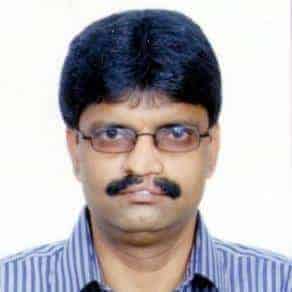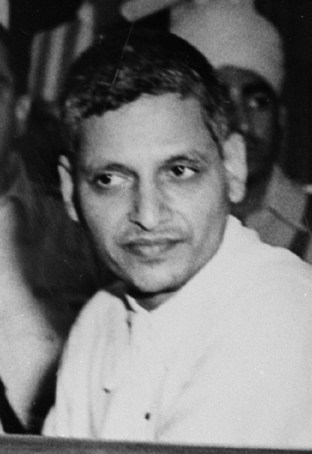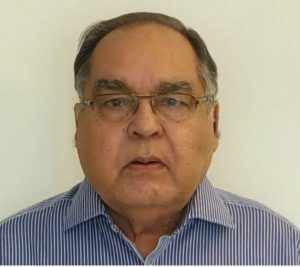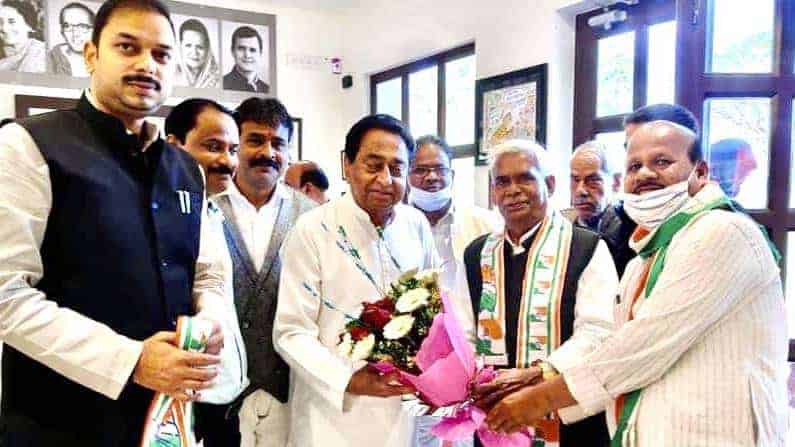
Former Rajya Sabha member and proud Aligarian or alumnus of Aligarh Muslim University (AMU) Mohammad Adeeb recently recorded a video that has gone viral. In the video Adeeb has directed his outburst against Congress leaders for keeping quiet over the induction of former Hindu Mahasabha member Babulal Chaurasiya into Congress by former Madhya Pradesh chief minister and senior Congress leader Kamal Nath. Chaurasiya’s claim to fame (or infamy) is that he built a temple to Mahatma Gandhi’s assassin Nathuram Godse.
Adeeb’s diatribes against Congress leaders and his addressing Kamal Nath as “Godse Kamal Nath” would have been dismissed as a former parliamentarian’s personal grouse had he not brought in the Muslims of India in the debate. Addressing Congress leaders, Adeeb aggressively says that Muslims have accepted they are “useful” for parties to form governments. But he also says, “Hamare saath jo kiya so kiya lekin Bapu ko do bara mat maro (whatever you have done with us it is known but don’t kill Bapu (Gandhi) again.”
He calls upon Congress leaders to stop addressing Sonia Gandhi, Priyanka Gandhi and Rahul Gandhi with their surnames if Kamal Nath is not punished for inducting Chaurasia into Congress. “Call them Sonia, Rahul and Priyanka without using Gandhi surname,” exhorts Adeeb who commands respect across the political aisles.
Adeeb’s anger is understandable. His concern is genuine. He rightly recalls that from the holocaust of 1857 to the tragedy of partition in 1947, Muslims never flinched from sacrificing their lives for the country. And when it came to choosing between secular India and Islamic Pakistan, a huge majority of Muslims decided to live in Gandhi’s India and rejected Mohammad Ali Jinnah’s Pakistan. Muslims preferred India because this is the land that their ancestors made their home, this is the country where, to quote Maulana Abul Kalam Azad’s historic speech delivered from the stone steps of the iconic Jama Masjid soon after partition, their caravans (ancestors of Muslims) had come and done wazu with the waters of the Yamuna. Was it not Maulana Azad again who, on another occasion, said that, if a farishta or angel came down from the skies and asked from the Qutb Minar what would he choose between swaraj and Hindu-Muslim unity, “I will choose Hindu-Muslim unity even if swaraj is delayed?” The Maulana’s oratory and scholarship earned him the rare honorific of Imam-ul-Hind (leader of India) from the masses.

Godse’s admirers invariably admire a mercy petitioner who also became a patriot. And it is rationalized that the British’s oppression inside the cellular jail in Andaman was unbearable. Of course, the prisons of the Raj didn’t have a bed of roses waiting for the inmates. And our freedom fighters did suffer misery and torture at the hands of the imperialists. But here it is instructive to recall how Maulana Azad conducted himself inside the jail. He wrote letters but not to the British officials. He addressed his thought-provoking letters in purple prose laced with Urdu and Persian couplets to a friend, but never posted them. All the letters, post-his release from prison, were compiled into Ghubaar-e-Khatir, a masterpiece in Urdu. Look at another incident worth recalling here.
Maulana Azad was in Ahmednagar Jail when he received a telegram from Calcutta informing him of his wife’s serious illness. The authorities told him he could get parole if he made a request to the government. “I refuse to plead with this government,” Azad said. His wife died and was buried in his absence.

Adeeb doesn’t refer to that episode in the life of Maulana Azad in his video but does say that “we (Muslims) have forgotten if there was a Maulana Azad.” However, he mentions another freedom fighter-journalist and poet Maulana Mohammed Ali Jauhar’s pledge about not to die in a slave country. Addressing the Roundtable Conference in London in November 1930, Maulana Mohammed Ali told the British: “I would prefer to die in a foreign country so long as it is a free country, and if you do not give us freedom in India, you will have to give me a grave here.” His grave is neither in India nor in Britain. He is buried near the Dome of the Rock in Jerusalem, a place from where Muslims believe, the Prophet ascended to heaven.
Adeeb’s pain is not personal. He articulates the huge anguish of the community at the great betrayal by present leaders of the Congress. What BJP is doing to the community is according to the script the Sangh Parivar prepared decades ago. What Congress has done to the community is something Muslims never imagined when they tossed aside the diabolical two-nation theory in 1947 and decided to link their destiny with Congress. They listened to Maulana Azad’s advice and didn’t create their own political party.
But it is an open secret that some Congress leaders have been closet sangh pracharaks and have silently killed the party of Gandhi, Nehru and Maulana Azad from within. In its attempt to play soft Hindutva, Congress has lost the support it once enjoyed among the minorities and the Dalits. Adeeb mentions how Kamal Nath, during the campaign in Madhya Pradesh, tried to present a secular Rahul Gandhi as “Shiva Bhakt”. It didn’t work much. Narendra Modi is a “bigger and better” Hindu if Hindus were to choose a leader because of his or her religion. Neither Rahul’s temple visits and Priyanka’s dips in the holy Ganga can save Congress from sinking unless the party is overhauled.
Adeeb repeatedly calls upon leaders like Ghulam Nabi Azad, Kapil Sibal, Shashi Tharoor and Digvijay Singh to save Congress from the enemies within. I am surprised Adeeb who was twice student union president at AMU and has had a long career as an active politician still banks on Ghulam Nabi Azad. Social media is filled with memes and jokes about how Azad is poised to become “Ghulam” of a certain ideology and its most famous symbol in contemporary Indian politics. If the “G-23” leaders of the Congress were serious about saving their party, they would have raised a banner of protest against entry into the Congress fold of someone who glorified Gandhi’s killer. Because, Gandhi and Godse symbolize, contrary mindsets. The likes of Adeeb will be made to lick their wounds as the divided house of Congress doesn’t want its redemption.
Mohammed Wajihuddin, a senior journalist, is associated with The Times of India, Mumbai. This piece has been picked up from his blog

